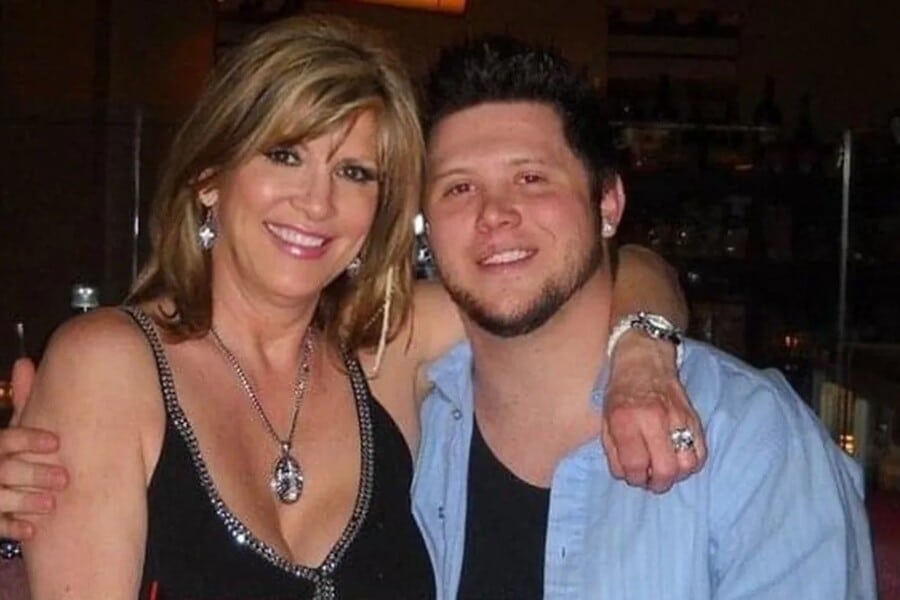
As Cynthia Portaro approached the courthouse to confront the person responsible for her son’s death, she embraced a choice that would astonish all who heard it.
In the heart of Las Vegas, a story unfolds that defies the expected reactions to tragedy. It’s a tale that weaves through the depths of a mother’s loss, touching on the universal chords of forgiveness, redemption, and unwavering faith. Cynthia Portaro stands in the face of her son Michael “Mikey” Portaro’s brutal murder with a determination to heal and a trust in a higher power that lights her way through the darkest times.
Her path showcases an extraordinary shift from the acute anguish of a mother’s worst nightmare to a journey of healing and finding meaning. Cynthia’s narrative isn’t just about conquering the depths of grief; it’s about opening her heart to forgiveness and advocating for change that resonates through society, rooted in a deep conviction in the power of second chances and the fortitude that faith can provide. Her story is a beacon of hope, showing us the transformative strength of channeling deep sorrow into a catalyst for positive change and self-discovery.
A Mother’s Unfathomable Loss
In 2011, a day like any other turned into a nightmare for Cynthia Portaro, marking the beginning of an unfathomable journey through grief and loss.
Her son, Mikey, a young and aspiring hip-hop artist known for his infectious energy and unwavering kindness, was mercilessly killed outside a Las Vegas pub, a place where moments before, life was as normal as it ever could be.
At the tender age of 22, Mikey was more than just a musician aspiring to leave his mark on the world through his art; he was a source of light and hope.
His spirit, characterized by a profound compassion that touched the hearts of everyone he encountered, made him not just a son and a brother in his own family but a beloved figure in the wider community.
Mikey’s murder sent shockwaves through the hearts of those who knew him, painting a stark contrast to the life he led and the joy he spread. The impact of his untimely death transcended the loss of a promising artist; it represented the loss of a kind soul who dreamed of making the world a better place through his music and actions.
The community, which had once celebrated his talent and generosity, now mourned a void that seemed impossible to fill. For Cynthia, the loss was immeasurable—a son taken too soon, leaving behind a legacy of what could have been and the painful reality of a future without him.
This tragic event highlighted the fragility of life and the devastating impact of violence, not only on the victims but also on the families and communities left to navigate the aftermath of such senseless acts.
The Path To Forgiveness
The road to justice was fraught with pain and despair. The killer, identified through a blend of tenacious police work and crucial tips from the public, was found to be a young man named Brandon J. Hill. The evidence against him was irrefutable, leading to his conviction. However, it was during this tumultuous period that Cynthia experienced a profound spiritual awakening.
As she prepared to face her son’s murderer, a voice within urged her to forgive. This wasn’t a quiet, gentle nudge but a powerful, divine command that challenged every instinct she had. Forgiveness, in this context, was not a sign of weakness but an act of immense strength and faith. It led her to make an astonishing request: to remove the death penalty from consideration in Hill’s sentencing. This act of mercy was not just for Hill but also a testament to her faith and a tribute to the son she loved so dearly.
A Journey Through Grief
Cynthia’s life narrative extends far beyond a mere act of forgiveness. The years following saw her facing profound challenges, including the tragic death of her daughter, Christina, in an ATV accident, and battling cancer alongside her husband, who tragically passed away in 2014. Despite these torrents of sorrow, Cynthia’s unwavering faith served as her guiding light, providing her the resilience to overcome despair and forge ahead.
Currently, Cynthia has channeled her adversities into a meaningful purpose. Triumphing over cancer, she now thrives as a life coach and writer. Her book, “Beyond the Unthinkable,” captures her arduous journey, offering comfort and direction to those struggling with grief. Her initiatives extend further, advocating for significant societal reforms, notably her opposition to the death penalty and her active participation in the Nevada Coalition Against the Death Penalty, marking her story as one of transformation from pain to purpose.
Reflections on Justice and Humanity
Cynthia’s story prompts a reevaluation of our concepts of justice and retribution. In her advocacy, she underscores the belief that true justice isn’t always served through the harshest punishments but can also be found in the capacity for compassion and forgiveness.
Her actions in the courtroom that day—requesting leniency for her son’s killer—speak to a profound understanding of justice, one that considers the possibility of redemption and the importance of addressing the root causes of violence.
Legacy of Love
Cynthia Portaro’s journey is a powerful reminder of the indomitable human spirit’s capacity to overcome unimaginable pain. It challenges us to rethink our responses to tragedy and injustice, advocating for a world where forgiveness and compassion are paramount. Her story is not just about the loss of her beloved son but also about the transformative power of love and faith. It is a testament to the idea that even in the aftermath of the most tragic events, it is possible to forge a legacy of hope, healing, and change.
In a society often dominated by narratives of vengeance and retribution, Cynthia’s story stands out as a beacon of light. It challenges us to confront our own beliefs about justice, forgiveness, and the power of healing.
Through her unwavering faith and her remarkable journey of forgiveness, Cynthia Portaro offers a different kind of story—one that speaks to the resilience of the human heart and the transformative power of love, even in the face of profound loss.
As Cynthia continues to navigate her path, her work as a life coach and her advocacy against the death penalty embody her commitment to making a difference. She not only honors the memory of her son and daughter but also inspires others to consider the impact of their actions and the potential for forgiveness in their lives. Her story, deeply intertwined with themes of faith, justice, and healing, remains a poignant reminder of the complexity of the human experience and the enduring power of love to bring light to the darkest places.








